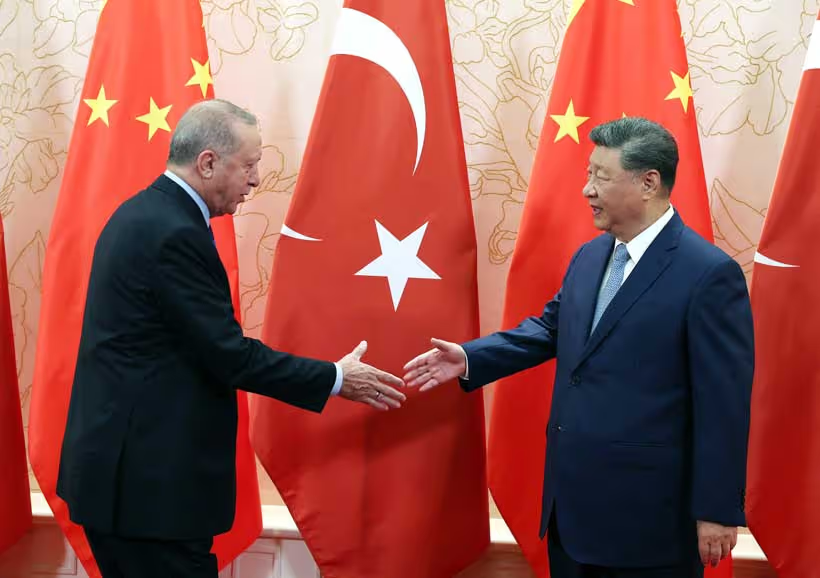
President Recep Tayyip Erdoğan’s recent trip to China for the Shanghai Cooperation Organization (SCO) summit could have raised eyebrows a decade ago. Today, Turkey’s overtures to non-Western initiatives are no longer surprising to the US and Europe. Yet, what does this visit say about Turkey’s place in the shifting balance between the United States and China?
The answer lies in Turkey’s careful attempt to navigate the growing rivalry between Washington and Beijing. For Ankara, China is both a partner and a challenge. The U.S. remains Turkey’s security anchor, but it is also an unpredictable ally. Erdoğan’s presence in Beijing was not about picking a side; it was about keeping Turkey’s options open.
Why Erdoğan Went to China
The SCO summit gave Erdoğan a chance to sit at the same table as Xi Jinping, Vladimir Putin, and Narendra Modi. For Turkey, participation signals that it is not bound to one camp and that it can build ties with rising powers beyond the transatlantic alliance.
Domestically, Erdoğan also wanted to project an image of global relevance. At a time when Turkey’s economy is under stress and its relations with Europe remain strained, being seen among Asia’s heavyweights supports his narrative that Ankara is a global player, not just a regional one.
But Erdoğan’s choreography in China was telling. He attended the summit and met key leaders, but he avoided the grand military parade that showcased Chinese power. Foreign Minister Hakan Fidan was sent in his place, positioned discreetly in the background. Erdogan’s health reasons could be one possible reason. Erdogan’s stamina could not bear walking too much. Yet, another likely reason could be Ankara’s balancing act between the two superpowers. Turkey values engagement with China, but not at the cost of alienating Washington. After all, who would know what reaction Trump would give to this parade? Erdogan could not risk his personal relations with President Trump.
Navigating the U.S.–China Rivalry
Turkey’s foreign policy has long been defined by balancing great powers. During the Cold War, Ankara was on NATO’s southern flank against the Soviet Union. Today, it finds itself again between a global rivalry — this time between the U.S. and China.
For Washington, Turkey’s geography has always been vital: it borders Russia, Iran, Syria, and the Black Sea. That has given Ankara leverage in NATO and in its dealings with U.S. presidents from George W. Bush to Joe Biden. Yet U.S.–Turkish ties are riddled with mistrust. Disputes over Syria, sanctions, and Erdoğan’s authoritarian turn have strained the partnership.
For Beijing, Turkey is useful but not indispensable. China already enjoys strong partnerships with Russia, Iran, and the Gulf. What Ankara offers Beijing is mainly symbolic: a NATO member willing to show up at an SCO summit helps China argue that Western unity is fraying.
This asymmetry explains Turkey’s strategy. Ankara cannot rely completely on Washington, nor can it expect China to treat it with the same importance the U.S. once did. Instead, Turkey plays both sides, seeking economic benefits from China while preserving its security ties to the West.
The Dynamics of Turkey–China Relations
Turkey–China relations have deepened over the past decade, but they remain uneven.
China is a major investor in Turkey, funding infrastructure projects and providing loans. Trade, however, is heavily lopsided: Turkey imports far more than it exports, contributing to its chronic current account deficit. Still, Ankara sees Chinese capital as an important supplement to its fragile economy. Chinese investments in Turkey, reaching $9 billion by 2023, have grown under the Belt and Road Initiative, with key projects like the $940 million Kumport port, $1.7 billion Hunutlu power plant, and BYD’s $1 billion EV factory. Alibaba’s $1 billion logistics hub and over 1,300 Chinese firms highlight deepening ties. $41.7 billion trade deficit in 2023 raises concerns about Turkey’s economic dependency on China.
On politically sensitive issues for China, Turkey has softened its stance. In the past, Ankara was one of the loudest critics of China’s repression of Uyghur Muslims. Today, it has toned down its rhetoric, sometimes even cooperating with Beijing in extraditing Uyghur activists. This shift reflects Erdoğan’s desire to avoid jeopardizing economic ties.
In security, there is little evidence of cooperation. Turkey’s defense industry is deeply integrated with NATO systems, and its military planning depends on Western technology and intelligence. Ankara cannot replace that with Chinese partnerships, even if it wanted to. In short, Turkey looks to China as an economic partner and a diplomatic option, but not as a full alternative to the West.
Turkey in a China-Centered World
Ankara will not be at the center of China’s global vision. Unlike Washington, which long relied on Turkey’s geography for its Middle East and Black Sea strategies, Beijing has other routes and partners. Russia provides access to Eurasia; Iran and the Gulf states secure energy; Central Asia offers land connections. Turkey is valuable, but not irreplaceable.
Erdoğan’s trip to China was less about turning the East and more about hedging bets. In a world where U.S. leadership feels uncertain and China’s rise is undeniable, Turkey is determined not to be cornered. But there are limits. Economically, China is important; strategically, it is not a substitute for NATO. In a China-centered world, Turkey would be a secondary partner, not a linchpin. For all its interest in diversifying ties, Ankara still depends on Western alliances for its defense and much of its economic stability
The SCO summit was therefore a stage for Turkey’s balancing strategy. Erdoğan’s presence showed openness to China, while his absence from the parade reminded everyone that Turkey is still, at its core, a Western power. Navigating between Washington and Beijing may give Ankara short-term flexibility. But in the long run, Turkey will have to decide how much of its future lies in the East, and how much still rests with the West.